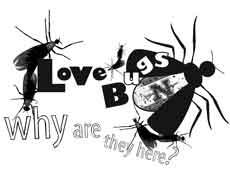The “Plecia nearctica,” commonly known as the love bug, comes out twice a year (around September and May) to display its love for all to see. These little insects love Louisiana’s climate, they love each other, and most visibly, they love the bumpers and windshields of cars. Biology professor John Doucet seems to be one of the few who love love bugs. Doucet has dedicated much time and energy studying this creature. Last year, he began a set of genetics studies to find ways to control populations and find ways to make love bugs beneficial to man.
According to Doucet, the love bug is an invasive species from Mexico that began traveling north during the 1930s. Since then, love bugs have continually traveled eastward and currently claim residence primarily in coastal Texas, Florida and Louisiana, and as far north as the Carolinas.
Doucet explains why love bugs seem to always travel in pairs.
“‘Cause they like to have sex,” he says. “Once the love bugs are attached, the female controls both walking and flying. I guess about half of (you) will be thrilled to hear that.”
Unfortunately for the male, this will be his first and last sexual experience. Following fertilization, the attached male “is digested from inside out in order to provide nutrients for the offspring,” Doucet says.
Despite claims that love bugs serve no purpose, they do play a role in the local environment, Doucet says.
“Love bugs do perform a needed job for humans,” Doucet says. “The larva eat tons of dead grass but don’t touch the live grass.”
It is this natural occurrence that may help Doucet find a way to use love bugs advantageously.
“For some reason,” Doucet says, “love bugs are attracted to solar breakdown components of automobile exhausts.”
This combination of feeding on dead grass, which is usually found on the roadside, and the insect’s attraction to automobile exhaust may explain love bugs’ love for cars.
Some people believe an abundance of love bugs predicts a light hurricane season.
“Ironically, last year’s first hatching occurred the day after Katrina because of the extreme heat and moisture,” Doucet says.
People without Doucet’s vast scientific knowledge of the insect also profess their opinions about love bugs.
Margaret Anglada, manager of Drop In, Inc. in Thibodaux, believes the love bug problem has remained about the same since she was hired at the carwash two years ago.
She tells her customers who complain about the love bugs on their cars to use dryer sheets to scrub them off.
“They seem to work the best,” she says.
Unless, that is, you have family and consumer sciences teacher Tiffany Papa’s husband’s innovative invention he calls “The Love Bug Buster.”
Many people have seen Papa’s car on campus, shielded and prepared for the love bug battle, Papa says.
“He wraps our bumpers with a big roll of plastic wrap,” Papa says. “He applies heat to make it stick and then cuts slots around the grill.”
Papa jokes about her husband’s offer to sell his invention for just under $50.
“It lasts about a week. It’s easy to take off, and you have a clean car that is love bug free,” Papa says.
For people who hope this pest will simply vanish in the near future, Doucet says it is not likely love bugs will be leaving anytime soon.
“In my opinion swarms are lighter here recently than in the last decade, but as long as there are roads and dead grass in this type of temperature, they will be around,” Doucet says.
Because love bugs will continue to visit the area twice a year, and they will continue to do so for years to come, Brandon Picou, English senior from Montegut said, “They are here for like three weeks, and then they die, so people should just deal with them.”
As evident in Papa and Anglada’s approach to the problem, it appears people are already “dealing with them.








